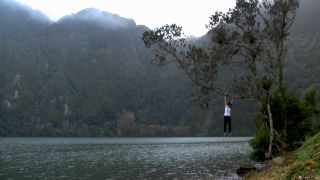, , 2014
Salomé
Lamas

Born in Lisbon in 1987, Salomé Lamas ranks among Portugal’s most interesting young filmmakers. Both in cinema and the context of the visual arts, she explores the boundaries and circumstances of documentary filmmaking in manifold ways. With minimalist settings and low production costs, Lamas achieves an intellectual and emotional urgency all the greater.
After a series of award-winning short films like A Comunidade (The Community, 2012) and Encounters with Landscape (3x) (2012), Lamas’s first full-length documentary Terra De Ninguém (No Man’s Land, 2012) won virtually all the national prizes at Doc Lisboa and made the director instantly known outside her native country’s borders. The film premiered in the Forum section of the Berlinale and was also shown at other prestigious festivals and venues, including the MoMA’s Documentary Fortnight 2013, Viennale, Fid Marseille, Harvard Film Archive, Pacific Film Archive, New York Museum of Moving Images and the Buenos Aires International Festival of Independent Cinema.
Since Terra De Ninguém, Lamas’ films have been produced by “O Som e a Fúria”. The company’s films, such as Miguel Gomes’s 2012 Berlinale hit, Tabu, have shaped the face of contemporary Portuguese film. And former DAAD Artists-in-Berlin guest (2012), director Sandro Aguilar, is one of the founders of the artist collective behind “O Som e a Fúria”. According to the influential Hollywood magazine Variety, Lamas’s Terra De Ninguém impressively underlines the company’s high standard of presenting “visually engaging, intellectually uncompromising cinema” that manages to “appeal to the audience of both festivals and art house cinema.”
In addition to her artistic endeavors, Lamas is also a sought-after lecturer and film scholar. At the moment, she is doing her doctorate in film studies at the University of Coimbra, Portugal. She studied film directing and editing at the Escola Superior de Teatro e Cinema (ESTC) in Lisbon and the Film and TV School of the Academy of the Performing Arts (FAMU) in Prague. After that, she earned an MFA at the Sandberg Instituut in Amsterdam.
A fixed camera position. A chair. A man. A neutral space. No man’s land. Lamas does not need much more to make a deep impression in her award-winning long film debut Terra De Ninguém. Paulo de Figueiredo (66) is talking about killing. As a young man, he was a soldier in an elite Portuguese commando during the colonial wars in Mozambique and Angola. After the Carnation Revolution, he worked as a bodyguard in Portugal, then as a mercenary hired by the CIA in El Salvador, and ultimately went on to carry out contract killings as a member of an Anti-Basque underground organization GAL. He reports indifferently how he “never took home prisoners, only corpses” in Angola and how he would later, in peacetime Portugal, frequently visit the emergency room so he could breathe in the “sweet smell of blood” again. History and stories mix together; self-staging and confession merge into one. The filmmaker reflects on and researches history in the vein of Walter Benjamin: Lamas does not believe in authenticity or historical truth as static things. Her film is the dense, unsettling protocol of a shadowy existence and simultaneous reflection on the fundamentals of documentary filmmaking. Terra De Ninguém has been shown at countless European, North and South American film festivals and won awards at the Doc Lisboa and the Documenta Madrid.
Lamas’s short films and video installations are often powerful portraits: in A Comunidade, (2012) (Vila do Conde Short Film Festival Best International Documentary, Portugal), she shows the people at the oldest campsite in Portugal. In comparison, a seemingly dry, philosophical assumption is the starting point for Lamas’s work in Encounters with Landscape (3x) (2012) (Media 10-10 Best International Short Film, Belgium, and New Talent Award Indie Lisboa, Portugal)and other films. In Encounters, Lamas puts Kant’s idea of the sublime, beautiful and noble to the test on her own body, which, in the raw landscape of Sete Cidades, Azores Island, makes for scenes with sometimes funny, other times frightening consequences.
Theatrum Orbis Terrarum (2013) video installation acts as a map made of memories that sketch out their own territory, constructing and reconstructing the minute borders existing between the three screens. The installation was first presented at the Portuguese National Museum for Comtemporary Art – Museu do Chiado and its short film version premiered at Rome Film Festival.
She is currently working on two long-length films El Dorado set in Peru and Extinction set in Transnistria, produced by O Som e a Fúria in international co-production.
Text: Maike Wetzel
Translation: Jocelyn Polen
2013 Theatrum Orbis Terrarum (video installation, HD, 26’)
2012 Terra de Ninguém (documentary, HD, 72’)
2012 Encounters with Landscape (3x) (short film, HD, 29’)
2012 A Comunidade (short film, HD, 30’)
2012 VHS-Video Home System (short film, HD, 39’)

